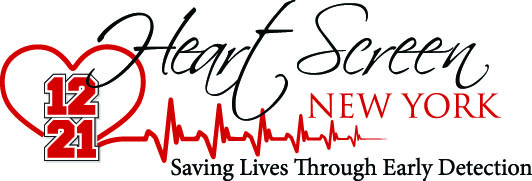Sudden Cardiac Arrest
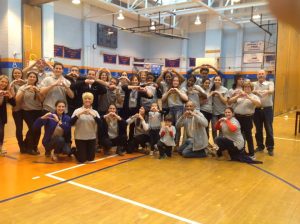
The catastrophic death of a child or young adult during physical activity is a devastating event with compelling justification to implement effective preventive strategies. Cardiovascular screening in athletes is routinely practiced and endorsed by most major sporting and medical associations including the American Heart Association (AHA), European Society of Cardiology (ESC), and the International Olympic Committee (IOC). A substantial challenge to screening is that most apparently healthy individuals with unsuspected cardiovascular disease are asymptomatic, and SCA is the first clinical manifestation of cardiac disease in a significant percentage of athletes who suffer sudden death.
A comprehensive personal and family history and physical examination are recommended components of cardiovascular screening. However, history and physical examination alone offer limited sensitivity in identifying youths at risk for SCD, The inclusion of a resting 12-lead electrocardiogram (ECG) in the cardiovascular screening of youths greatly increases the sensitivity to detect potentially lethal cardiac conditions. Integrated screening programs utilizing ECG, echocardiogram, detailed physical evaluation form and family history offer an early opportunity to reliably identify youths at risk. Early detection can reduce the rate of SCD in youth through appropriate medical intervention.
In recent years, contemporary standards of ECG interpretation using modern criteria to distinguish physiologic cardiac adaptations in athletes from underlying pathology have substantially reduced false-positive results and the need for unnecessary diagnostic evaluations. There is an urgent need to study a contemporary model of cardiac screening in the young to assist in the development and implementation of improved cardiovascular screening guidelines in the U.S.
Heart Screen New York organizes free youth heart screenings for adolescents and young adults. The goals of these screenings are:
- To detect cardiovascular conditions with the potential for sudden death in the youth
- To reduce sudden cardiac death through early detection and appropriate medical interventions, activity modification, or withdrawal for athletic participation if recommended by a physician
- To provide a unique training opportunity for medical students, residents, fellows and practicing physicians to gain experience in cardiovascular screening and ECG interpretation
- To raise awareness and educate schools and communities about Sudden Cardiac Arrest warning signs and symptoms, and the value of cardiac screening
The youth heart screen consists of a Heart Health Survey investigating signs and symptoms and family history of cardiac conditions, blood pressure and physical examination, and ECG. An on-site echocardiogram is conducted in cases with a positive finding on history, physical examination or ECG. All results are reviewed by cardiologists and physicians experienced in cardiac screening.
Risk Factors
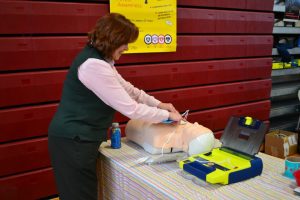
Some common risk factors needed to keep into consideration when having “no known risk to cardiac arrest” are a heart healthy lifestyle. If you follow a heart-healthy lifestyle, this can help lower the risks for most heart issues. In order to keep a heart healthy lifestyle you should include the following no matter what age or shape you’re in:
- Manage things that make you stressed
- Keeping up on your physical activity
- Quit smoking
- Maintaining a healthy weight
- Healthy eating
Is Your Child Athlete At Risk?
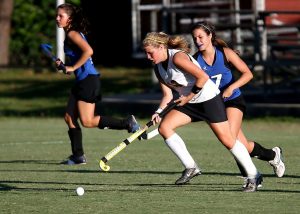
If you are trying to decide whether your child or yourself should have pre-sports heart screening, there are a bunch of things needed to consider:
- Family history of sudden death. If there has been someone in your family who has passed from sudden or prematurely you may want to consider getting a preparticipation ECG
- Personal history of heart disease. If you do have any kind of heart condition, heart surgery or have had a heart attack, this is another reason you should consider getting an ECG and other testing from a specialist
- If you are experiencing cardiac symptoms during or after exercise. These symptoms include fainting, dizziness, lightheadedness, chest pain or discomfort during exercise, palpitation, or a sudden acceleration or deceleration of heart rate
All of these considerations are very important in considering a screening for athletes or young adults to prevent the horrible tragedy of sudden heart failure.
What causes Sudden Cardiac Arrest in young individuals?
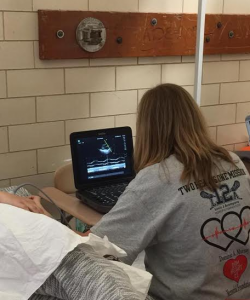
Sudden cardiac arrest in a younger person usually is a defect in the heart or problems with the electrical circuitry. 40 percent of all cases is a thickening of the heart muscle. A big issue that mostly is hard to spot. There are some warning signs that include things such as dizziness and shortness of breath, but can be rare or dismissed by a young adult or young athlete who is used to overworking them self. Since most are hard to spot, a very important you want to consider is an EKG, which can detect any potential heart trouble by looking for that abnormal electrical circuitry. Overall having an EKG or cardiac screening, can help most, not all, but most athletes or young adults with the question most ask which is if you’re at risk.
Sudden cardiac arrest symptoms usually have no warning and need to be immediately taken care of. These symptoms include a sudden collapse, no pulse, no breathing, and a loss of consciousness.
What to do?
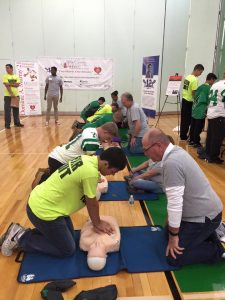
Some tips if you suspect cardiac arrest include:
- Call 911
- Perform CPR. Very quickly check the unconscious person’s breathing. If the person seems to not be breathing correctly start doing CPR. You have to push hard on the person’s chest and begin about 100 compressions a minute.
- If this seems to not be working if there is one available use a portable defibrillator. Having one early is essential. The target goal is less than 3-5 minutes from the time of the individuals collapse. Once it’s attached to the individual, the machine will figure out and treat the hearts abnormal rhythms.
For victims of sudden cardiac arrest (SCA), the time from collapse to defibrillation is the single greatest determinant of survival. That is why the Louis J. Acompora Memorial Foundation advocates the accessibility of automated external defibrillators (AED). The window of opportunity is short. Survival for cardiac arrest caused by ventricular fibrillation (VF) declines by approximately 7 to 10 percent for each minute without defibrillation. Beyond 12 minutes following the collapse, the cardiac arrest survival rates are only 2 to 5 percent.
Emergency medical services (EMS) systems that can be accessed quickly by telephoning 911 have been shown to improve survival form SCA by providing early defibrillation. However, most EMS systems cannot deliver defibrillation in a time frame that can significantly increase survival from SCA. As a result, the national survival rate for SCA hovers around a dismal 5%.
Heart Screen New York
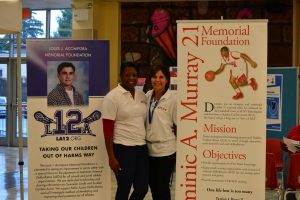
If you feel you’re at risk and need a heart screening be sure to register online at Heart Screen NY to schedule an upcoming screening. The testing usually takes 25-30 minutes which can prevent a sudden cardiac arrest that was never detected through a regular examination. Just imagine the heartbreak of parents or siblings when they discover their child could still be alive if their kid got the proper tests prior to high-intensity sports. Come contact the Heart Screen NY today and watch all your worries diminish with a free heart screening!
